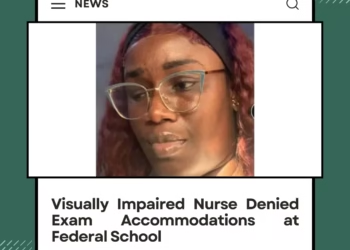Should patients help nurses?
Do patients have any help to render to nurses?
Do nurses need the help of patients?
I believe you must have interpreted the topic of this blog post as the questions above. Last week, I wrote extensively about the #PBOR. Today, I will be writing on 3 patients right that will need the cooperation of patients.
Nurses are to care, advocate care, alleviate suffering and eradicate sickness, but nurses have no power to practice successfully if patients have failed to cooperate with them.
Patients ought to do certain things if a quality nursing care should be rendered. Below, we will be looking at 3 patients right and how patients can help nurses.
1. Right to receive urgent care
The word urgent means ‘requiring immediate attention’.
Most times patients walk into the hospital seeking for an urgent care when they never cared for themselves in the right manner.
When kind of illness needs an urgent care?
Fever, malaria, typhoid fever, hypertension, hypotension or hyperglycemia.
Each of the illness I have mentioned and others you must have heard of needs an urgent care.
Albeit, do patients have to wait till the illness gets severe before bringing them to the hospital.
Say, Mrs Carrot has a 3years old girl. Mrs Carrot lives in a dirty environment and never keeps her 3 years old baby under the mosquito net or uses mosquito repellent.
Mrs Carrot’s daughter is bitten by mosquitoes, and shows the symptoms of malaria: vomiting, high grade fever, diarrhea, restlessness.
Rather than taking her daughter to the hospital, Mrs Carrot prepares herbs for her daughter. The symptoms didn’t reduce, rather it increases.
3 days later, Mrs Carrot decides to take her daughter to the hospital when her health deteriorates. Since she lives in a village, she drives across few villages to reach the government facility which is about 45minutes drive. She reaches the hospital at 10am only to meet over 300 patients who are also in the same shoes as her daughter.
She rushes into the emergency center, she meets 4 nurses on duty, busy with other patients. She cries and tells them her daughter is dying and the illness started few hours ago.
The nurses asks her to calm down, the doctor tries to attend to her, but there are over 10 patients who needs his attention as much as this baby do. The doctor asks Mrs Carrot to get some medications, unfortunately Mrs Carrot does not have a dime on her. She cries and says her daughter needs urgent care, but she doesn’t even have the money to get the medications.
With my above story, whose fault is it that Mrs Carrot’s daughter does not receive urgent care?
The doctor on call?
The nurse on duty?
Mrs Carrot?
May I tell you that a patient decides if he/she will be healthy.
How is that?
The nurses, doctors, health educators take their time to educate patients on how to stay healthy.
Media, social media, campaigns and advertisements are used as a medium to health educate patients in every way they should be healthy.
2. Right to decline care
The right to decline care as a patient is seen clearly in the consent asking process.
Nurses are been taught in school to ask their patient’s consent before carrying out any procedure on them.
As a nurse you have to respect our patients consent.
Though you must feel empathy for your patient.
Certain society, religious belief frown at the use of certain things like medicine, blood transfusion, surgeries.
It is the nurse’s duty to make them reason why they have to undergo such procedure and after explaining patient can either agree or refuse. No patient is supposed to be forced.
3. Right to quality care
Quality in this context is an adjective because it is used to qualify the level of care or treatment a patient should receive.
How much care does an out patient need to receive at the first visit?
The answer to the above question is an out patient (and in patients) needs a quality care.
A patient has every right to receive quality care in the hospital, and the kind of quality care comes as result of purchasing medications, nurses and other medical team care for the patients.
Still using Mrs Carrot as our character.
Mrs Carrot knows that her daughter has cerebral malaria, as diagnosed by the doctor.
She needs to purchase necessary medications, including some things like gloves, patients wear, food from the hospital.
Mrs Carrot says she does not have any dime, and she wants quality care.
Putting Mrs Carrot on a scale, you would address her as weird character.
What makes a care quality?
The nurse’s care or the use of medications?
Each of my options. A nurse is a person, who has been taught to care for people, whether sick, healthy or in a dying state.
Naturally, people tend to care for sick people because nobody wants his/her family to die.
How much more a nurse who has both the knowledge and sympathy to practice everything she learnt in school?
A nurse is always present in the hospital, a nurse is a constant factor which makes a patient’s quality care 50% sure.
The remaining 50% comes from the patient: purchasing of drugs, getting the necessary laboratory investigation done, eating, giving true and right health history, using medications, and above all giving a the healthcare provider consent to perform her duties.
Every patient deserves a quality care, but it would never be a success if a patient has failed to buy his drugs while he is on the bed
What then should a nurse do when a patient has failed to purchase drugs or give consent on a procedure?
Nurses are advocate, they are not just carers. They are strong people.
A nurse should assure the patient about the success of the procedure. Nursing procedures are not a ‘do and die’ procedure
It is not a surgical procedure
Talk to the patient in a calm tone
Ask why he/she frowns at the procedure
Could he refuse because of religious values, traditional values and personal reason?
You must know as a nurse to have a better understanding about who and what you patient is.
I hope you got value as both a nurse and a patient?
In what other way do you think patients can help nurses render a quality care to them?









